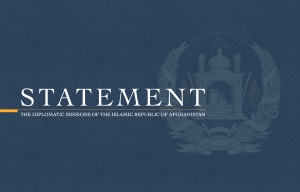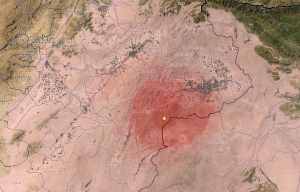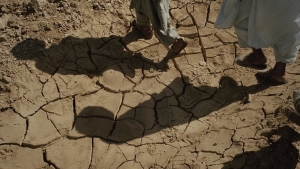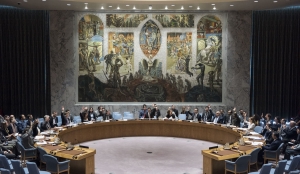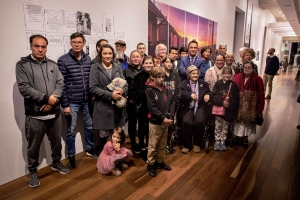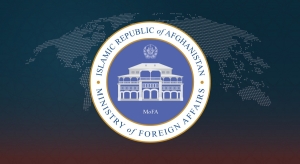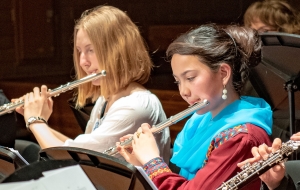Statement of the Diplomatic Missions of the Islamic Republic of Afghanistan: Marking One Year of the Taliban’s Military Takeover
15 August 2022
Today marks one year since the Taliban’s forced takeover and occupation of Afghanistan, which plunged the country into a deep political, humanitarian, economic, human rights and security crises. Afghan citizens are deprived of basic services and face grave human rights abuses and violations, poverty, repression, and fear. Almost overnight, the Taliban militant group rolled back hard-won gains achieved through the joint effort and sacrifice of the people of Afghanistan and the international community since 2001.
Despite the violent and illegitimate nature of the Taliban takeover, they were offered the opportunity to deliver on expressed commitments in relation to the fundamental rights of all Afghans, especially women and girls, inclusive and representative governance, as well as the binding obligations that Afghanistan will not become a safe haven for international terrorism. Many countries and international organizations adopted a policy of dialogue and engagement with the group, in the hope that such interaction would positively influence the Taliban’s approach and actions toward the people’s expectations.
One year on, the Taliban have not only totally failed to deliver on all their commitments but re-enacted draconian policies and directives. Among others, the group has banned girls from attending secondary education and systematically erased women and girls from public life by restricting their fundamental rights to work and play an active role in society. Preventing girls from education not only constitutes a grave human rights violation but also jeopardizes the country’s progress and future.
Arbitrary detentions, including of women activists, forced disappearances and forced displacements, collective punishment, including of minority groups, media crackdowns, extra-judicial killings, and torture, including of former members of the national security forces and government officials constitute normal practices under Taliban rule. These and other measures have perpetuated a climate of absolute fear and physical and psychological insecurity, forcing hundreds of thousands of Afghans to leave the country.
The Taliban have rejected consistent national and international appeals for the creation of an inclusive and representative government, which is critical for political stability and strengthening national trust in the country. Various political actors, from across different social, ethnic and political spectrums have explicitly expressed their readiness to engage in dialogue to reach a political understanding and consensus, based on the need for a viable political solution to the situation in Afghanistan, as highlighted in various platforms and processes. However, the Taliban as underlined in their manifesto released in May 2022, which rejects any kind of people-based government, remain defiant on the continuation of their exclusive and repressive rule against the desire and demands of the absolute majority of the Afghan people and the international community, pushing the country on a dangerous trajectory.
Several known international and regional terrorist and extremist groups have found a re-invigorated presence in Afghanistan. The killing of Ayman Al-Zawahiri, leader of Al-Qaeda in Kabul, affirmed that the Taliban are hosting and sheltering a coterie of foreign terrorist groups, which are threatening the security and stability of Afghanistan, the region, and the wider world.
We believe that given the Taliban’s unwillingness and inability to deliver on their expressed commitments, and the deteriorating security, humanitarian, economic, human rights, political, and social situation in Afghanistan, the international community should adopt a new and adjusted approach. To improve and stabilize the situation such an approach could include the following:
- Establish effective and meaningful forms of engagement at bilateral and multilateral fora in order to exert pressure on the group to respond to the demands of the people for a political process leading to inclusive and legitimate governance. Afghanistan’s future will have to include the Taliban, but not be determined and dominated by them.
- Engage and work with committed personalities of integrity who enjoy support from democratic constituencies. The people of Afghanistan are still determined to improve the situation and assume control of their future destiny. Experience shows that no system can survive in our diverse society without respecting and embracing the will of the people.
- Adopt more coordinated and effective measures to address the dangerous threat emanating from the presence of various foreign terrorist groups, which constitute a major security threat for Afghanistan, our region, and the wider world.
- Reinforce the UN travel ban for concerned Taliban leaders, as the group has continuously misused travel-ban exemptions by refusing to engage in any meaningful dialogue for a political settlement, as well as to enlist new individuals in the sanctions regime for violating the rights of the people of Afghanistan.
- Enhancing humanitarian assistance to meet the urgent life-saving and life-sustaining needs of the Afghan people.
- Enhance support for the preservation of the fundamental human rights of the people of Afghanistan, including the protection of the rights of women, girls, and other vulnerable groups. Robust international accountability measures should be put in place to deter further human rights, abuse of women’s rights and international humanitarian law violations.
- We call on the international community and the United Nations to seek pragmatic solutions to the current economic, political and humanitarian crisis in Afghanistan through putting in place all necessary measures to meet the urgent needs of the people of Afghanistan.
The diplomatic missions of the Islamic Republic of Afghanistan will continue to fulfill our historic responsibility at this crucial juncture in our nation’s life by representing the concerns, demands, and aspirations of millions of our voiceless compatriots. We remain firmly committed to meeting the needs of our growing and vibrant diaspora community including by providing continued consular services. We further remain committed to working closely with the host countries, friends of Afghanistan, and our diaspora community and contributing however possible to the ongoing international efforts to achieve a peaceful, stable, and democratic Afghanistan in which the rights, honor, dignity, and will of our people are upheld.
We express our gratitude to the international community for their continued commitment to the people of Afghanistan at this difficult point in time in our nation’s history.
END
Farsi version: بیانیۀ_نمایندگی_های_دیپلوماتیک_جمهوری_اسلامی_افغانستان_-_۱۵_اگست_۲۰۲۲.pdf
Pashto version: د افغانستان د ډیپلوماتیکو ماموریتونو اعلامیه - ۱۵ اگست ۲۰۲۲
The 17th of June is the World Day to Combat Desertification and Drought. Droughts are among the greatest threats to sustainable development especially in developing countries.
They are among some of the greatest threats to sustainable development, in not just developing nations but also developed states as well. Forecasts estimate that by 2050 droughts may affect over three-quarters of the world’s population.
This year, the theme of the International Day Against Desertification, and Drought is “rising up from drought together”, which emphasises the need of early action to avoid disastrous consequences for humanity and the planetary ecosystems.
This of course has already and will continue to have massive impacts on the state of Afghanistan. And whilst it is already a frequent and devastating phenomenon in Afghanistan, climate change is making it far more regular and more severe.
The current drought is worse and more widespread than the last one in 2018. According to the Afghanistan drought risk management strategy, by 2030, annual droughts in many parts of the country will likely become the norm, with weather prediction models warning of continued drought conditions in 2022.
With the warming of the planet the worst dry spell in two decades has gone alongside the implementation of the militant Taliban government. Climate change is expected to have sever effects on the country over the coming decades, with the ousted Afghan government and the United Nations projecting extreme temperature rises of more than 6 degrees Celsius, if global carbon emissions are left unchecked. As Afghanistan is one of the world’s poorest economies, and under the Taliban there has been a dislocation of billions of dollars of aid, this leaves Afghanistan more ill equipped than ever to combat the challenges of desertification and drought.
This year, according to the UN humanitarian response report, the country’s wheat crop will be reduced by nearly 2 million tons, and more than 3 million livestock are in danger of death due to lack of fodder and water.
As combination of climate change, Taliban's takeover and collapsing economy, over 20 millions of Afghans are in acute food insecurity and crisis (IPC 4 and 3). As a result, Afghanistan now has the highest number of people in emergency food insecurity in the world – this is a terrifying 35 per cent increase from the same time last year. More than one in two children under-five is facing acute malnutrition and will be at risk of death if immediate action is not taken. UNDP estimates that more than 90% of the Afghan population will fall below the poverty line in 2022 in a worst case scenario. This is an issue which needs to be immediately addressed for the safety of the people of Afghanistan, it is hard with the current Taliban regime, however every effort should be spared to assist the innocent people who continue to suffer under these extreme conditions.
Security Council Press Statement on Situation in Afghanistan
The following Security Council press statement was issued today by Council President Linda Thomas-Greenfield (United States):
The members of the Security Council expressed deep concern regarding the increasing erosion of respect for the human rights and fundamental freedoms of women and girls in Afghanistan by the Taliban, including through imposition of restrictions that limit access to education, employment, freedom of movement, and women’s full, equal and meaningful participation in public life, and emphasized that these restrictions contradict the expectations of the international community and the commitments made by the Taliban to the Afghan people.
The members of the Security Council further expressed deep concern regarding the announcements by the Taliban that all women must cover their faces in public spaces and in media broadcasts, only leave home in cases of necessity, and that violations of this directive will lead to the punishment of their male relatives. They also expressed concern regarding the decision by the Taliban to dissolve several key national institutions.
The members of the Security Council called on the Taliban to swiftly reverse the policies and practices which are currently restricting the human rights and fundamental freedoms of Afghan women and girls. They also reiterated their call on the Taliban to adhere to their commitments to reopen schools for all female students without further delay.
The members of the Security Council further expressed deep concern regarding the volatile situation in Afghanistan, including political, economic, social and security challenges and their impact on lives of the Afghan people, in particular continued terrorist attacks targeting civilians and civilian infrastructure, including in religious minority communities, across Afghanistan and cultivation, production, trade and trafficking of illicit drugs.
The members of the Security Council further expressed deep concern regarding the dire humanitarian and economic situation in Afghanistan, recognized the need for strengthened efforts to provide humanitarian assistance and other activities that support basic human needs in Afghanistan, emphasizes that the effective delivery of humanitarian assistance requires all actors to allow full, safe and unhindered humanitarian access for all humanitarian personnel, including women, and further recognizes the need to help address the substantial challenges facing Afghanistan’s economy, including through efforts to restore the banking and financial systems and efforts to enable the use of assets belonging to Afghanistan’s Central Bank for the benefit of the Afghan people.
The members of the Security Council requested the United Nations Assistance Mission in Afghanistan (UNAMA) to continue to closely monitor and report on the situation, and requested the Special Representative of the Secretary-General to continue to engage with all relevant Afghan political actors and stakeholders, including relevant authorities, on these issues, in accordance with the mandate of UNAMA, and keep the Security Council informed on progress.
Ambassador Wahidullah Waissi participated at the opening ceremony of Watandar, My Countrymen photo exhibition by Muzafar Ali in Adelaide.
The exhibition highlights identity and belonging linked to the Afghan Cameleers and their descendants in Australia.
In his opening speech, Ambassador Waissi discussed the significance of this exhibition and engagement of contemporary artists in presenting this less-known side of the Australian history.
Afghan refugee, photographer and human rights activist, Muzafar Ali, discovers that Afghans have been in Australia for 160 years it inspires a photographic journey to meet their descendants, his Watandar. Muzafar Ali in his remarks said that his search took him to the remote deserts, old Ghantowns and suburbs of South Australia in a quest to define his own new Afghan-Australian identity.
Through creative photography, this multimedia exploration of identity presents the lives of a largely hidden community, the Afghan Cameleer Descendants. A series of large-scale photographs are displayed alongside family heirlooms, cultural artefacts and Muzafar’s commentary at the Kerry Packer Civic Gallery of the University of South Australia.
"When I discovered there were Afghans already here, descended from people who arrived in the 1860s, I was compelled to capture their stories. I realised there were a number of issues connected to their stories: the stolen generation, racism and marginalisation. When I looked at these descendants I saw my own kids’ future. I want to show this through the photographs - these identities and connections, and explore the faultlines in the desert.” Muzafar said about his exhibition.
This exhibition is open until June 3rd, 2022 weekdays 9am - 5pm, until 6pm on Thursdays.
Statement of the Diplomatic Missions of the I. R. of Afghanistan on Recent Attacks on schools and places of worship of Shia Communities
Canberra, 22 April 2022 - We condemn in the strongest possible terms the spate of heinous attacks targeting institutions of education and mosques in Kabul, Mazar-i-Sharif and Kundoz – areas mostly populated by our Shia and Hazara compatriots.
Students were coming out of their morning classes when several explosions hit Abdul Rahim Shahid High School and the Mumtaz Education Centre in Dasht-e-Barchi, a western suburb of Kabul. Attacks against civilians and civilian infrastructure, including schools, universities and mosques, are a despicable violation of the international humanitarian law.
Yesterday, During the holy month of Ramadan, an explosion at a Shi'ite mosque in the northern city of Mazar-e-Sharif, killed tens of our innocent people, and a separate blast in Kunduz took away another 11 innocent lives. These egregious crimes are not just against Shia and Hazaras; they are against all of us, the people of Afghanistan.
After their military takeover, the Taliban promised security above all else, which proved to be nothing but an empty talk from a group which still keeps suicide squads in its ranks. The Taliban have demonstrated, time and again, that their promises cannot be trusted. They failed to reopen high schools for girls against their promise to both the Afghan people and the international community.
We call on the UN, OHCHR, the ICC and relevant mandate holders to authorize an immediate investigation into these crimes, with a purpose to identify and bring to justice all those responsible. We urge the international community to deploy all necessary instruments of prevention and protection in the wake of these attacks, which represent a deliberate pattern of violation of international humanitarian law.
We, members of the Diplomatic Missions of the of Afghanistan, sincerely extend our deepest condolences to all victims of these barbaric and inhumane attacks and to their families. We stand with all the people of Afghanistan, with our celebrated religious and ethnic diversity, in working for a lasting peaceful, representative governance and prosperity in Afghanistan, a shared home to all its citizens.
END
Today marks the 53rd anniversary of diplomatic relations between Afghanistan-Australia. Since its establishment in 1969, both nations have stood with each other & marked a turning point in the history of their bilateral relations.
The people of both nations share a friendly and long-standing relationship which can be traced back as far as the 1860s, when the Afghan Cameleers came to Australia to contribute to the carriage of explorer, assistance in transportation and outback development.
Over the past 20 years, Australia has been a strong contributor to the fight against international terrorism and extremism in Afghanistan through its diplomatic, defence and international development engagement. We acknowledge Australian’s sacrifices, in blood and treasure, its generous and friendly cooperation during our difficult times in Afghanistan.
Throughout their bilateral relations, both Afghanistan and Australia, have built strong links across development cooperation, humanitarian assistance, women and girls’ education, refugees, diaspora, and people to people contact.
Once a proud vibrant nation with 9.2 million enrolled students, of which 40% of were girls, today our people suffer from the violent and oppressive regime of the Taliban and regrettably there is no chance for Afghans, especially, women and girls, to exercise and benefit from the universal conventional rights, and opportunities in political, socio-economic, and cultural fronts.
Afghans have suffered for 40 years from conflicts and insurgencies. The country once again faces its darkest days as the violent militant group of the Taliban made return in power to control Afghanistan. This marks the most tragic episode in the history of struggle and survival of the Afghan nation.
We appreciate Australia’s generous assistance to the people of Afghanistan in response to the severe humanitarian crises. Due to the recent developments in Afghanistan, many Afghans and their families were forced to leave their home to avoid persecution. The interest and care which the Australian government and people have shown to make refugees feel better and safe is most exemplary. Australia’s decision to increase places for Afghan refugees under the humanitarian and migration program is a great proof of the power of human kindness and solidarity with the people of Afghanistan during these challenging times.
The Embassy of the Islamic Republic of Afghanistan in Canberra extends its sincere gratitude to the Government and people of Australia who have stood with us during the past 20 years and throughout those difficult times during and after 15th August, 2021. As we enter our 53rd anniversary, let us reflect upon our flourishing diplomatic relationship in the past and safeguard its strength for generations to come and look forward to enhancing it into the future.
Long live our friendship.
The 23rd of March marks the sad day for the Afghan girls and society where the dreams and aspirations of the Afghan girls, their families and the wider world have been shattered. After seven months of waiting, girls with eagerness and fervour made their way to what they hoped would be their first day back to school, since they have been denied to attend schools by the Taliban group.
During the negotiations with the US in Doha, and after military takeover, the militant Taliban group gave assurances and promised to the international community to reopen the schools for girls of all ages. Today, they have demonstrated yet again failure to uphold their promises.
Education is a fundamental human right, regardless of gender. The denial of this right has traumatised the whole of Afghan society, particularly the girls. As a consequence, it puts girls more at risk of violence, exploitation, marginalisation and poverty. Girls are entitled to the full development of their personality and sense of dignity. The politics of exclusion is nothing but further suppression and an absolute signifier of totalitarian policy of an untrusted militant group.
The Taliban’s promise to uphold the rights of all, including girls, is shallow one and we urge the international community not to take their words seriously. While sharing High Commissioner Michael Bachelet’s concerns and disappointments, we further reiterate our call on the United Nations and International partners to work for the formation of an inclusive, representative, accountable and responsible government that promotes and protects the rights of all, including girls and women.
We also share in the sadness of the young girls who went to school today with enthusiasm to learn, build bright futures, and become active members of the society, but had to return home in tears to their families. We demand that the Taliban immediately allow girls of all ages to return to school and respect their equal right to education.
#StandWithAfghanGirls
END
Nowruz, Dari/Farsi for ‘new day’, marks the spring equinox on March 21 each year, and is an ancient festival celebrating the Persian New Year. The International Day of Nowruz was officially recognised by the United Nations in 2010 and inaugurated into the Representative List of the Intangible Cultural Heritage of Humanity; celebrated across the world by many different countries and diaspora groups, and in the process bringing together different cultures and communities.
In Afghanistan it heralds the arrival of spring, the blooming of tulip flowers, and the greening of the plains and mountains that make up the Afghan landscape. In towns, cities and villages alike it is a time of great celebration and festivity, with families and people of different backgrounds coming together to welcome the first day of the year with colours, games and delicious foods.
Here in Canberra is no exception; and the Embassy of the Islamic Republic of Afghanistan wishes to extend its invitation to you to join us in welcoming the year 1401 with traditional festivities on Sunday the 20th of March at the Embassy grounds. Nowruz is an eagerly awaited date on the Embassy calendar, as we look forward to prosperous and peaceful new year for both Australia and Afghanistan, and our friends around the world.
Unfortunately, among other nonsense bans, Nowruz celebration is also totally banned under the Taliban extremists in Afghanistan who don’t believe in peace, don’t believe in harmony, don’t value cultural diversity, and don’t respect human dignity at all. The Taliban, IS-K and other terrorist groups are sticking in their totalitarian theocratic and harsh ideological belief based on misinterpretation of sharia law to promote clash of civilizations.
To make 1401 truly spectacular and given that we have entered a new century of solar calendar, the Embassy is proud to present New Year, New Century, International Day of Nowruz, featuring different activities, games, displays, exhibitions, performances, and more – there is something for everybody, and each family member can celebrate Nowruz in their own way.
There will be live music and live performances of traditional dance Attan by talented dancers and musicians travelling to Canberra from around Australia. Enjoy the performances while you admire the Embassy transformed by beautiful artworks and paintings by Dr. Yosuf Asefi, dazzling clothing displays and traditional carpets in rich colours. Sample some world-famous dry fruits and saffron tea or treat yourself to a lunch of delicacies as you have your name written in Afghan calligraphy.
Learn more about Nowruz as you view the Haft Sin table, representing seven important qualities for the new year, and taste the festive specialty, Meywa. Discover your Afghan horoscope. And if you’re more interested in understanding the past, take home a piece of Australia’s own history with an exciting and informative DVD documentary on Afghan Cameleers.
Try your luck and compete with your friends and family at popular traditional games such as kite flying, and ‘egg-fighting’ for a real taste of how Nowruz is celebrated in Afghanistan. For those amongst us who are more athletically inclined, play a spot of cricket and cheer on the Afghan team as it competes in the upcoming T20 2022 World Cup right here in Australia this October.
With all this and much more, the Embassy of Afghanistan is excited to announce its celebrations for Nowruz 1401. We look forward to welcoming community members, members of the diplomatic corps, members of Parliament and the public service, students, military personnel and all our other Australian and Afghan friends to welcome the New Year, New Century on Sunday the 20th of March.


